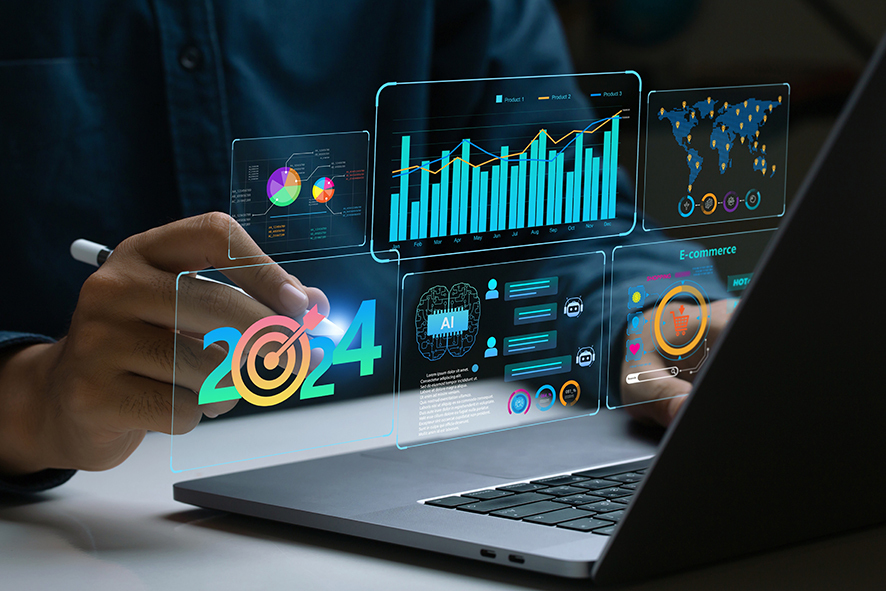Artificial Intelligence in 2024:
Key Trends and Innovations
2023/12/15

Image by chayanuphol from Shutterstock
Artificial Intelligence in 2024: Key Trends and Innovations
As we enter 2024, artificial intelligence (AI) stands as a testament to rapid technological progress, reflecting significant innovations that have unfolded in 2023. The introduction of OpenAI's ChatGPT just a year ago, for example, marked a significant leap in AI's capabilities and its integration into our daily lives. Now, AI is not just a novel concept but an essential component driving industries forward and influencing regulatory landscapes. This article aims to explore both the groundbreaking AI innovations that have already taken place and the key trends that are shaping the AI landscape in 2024.
Advances in Generative AI
Generative AI in 2024 is expected to break new ground in the realm of creative arts, significantly advancing beyond its original text and image generation capabilities. Pioneering tools like OpenAI's ChatGPT, Adobe Firefly, and Google Bard are at the forefront of this transformation. ChatGPT has evolved beyond basic text generation, now adept at creating custom versions tailored for specific purposes, integrating web searching, image generation (DALL·E), and various other functionalities, significantly enhancing its versatility in various applications. Adobe Firefly is revolutionising the visual arts and design fields, offering cutting-edge tools for digital artists and designers to innovate and explore new creative frontiers. Google Bard is also enhancing the field of conversational AI, making interactions more engaging and intuitive.
Furthermore, these advancements in generative AI are unlocking new opportunities for creativity and artistic expression. For instance, in music, AI algorithms are now capable of composing new sounds and songs, showcasing the potential for AI to contribute meaningfully to the arts. In the visual arts, AI-driven text-to-image generators lead to the creation of unique and innovative artworks.
In 2024, the expanding capabilities of AI are expected not just to transform the methods of creation but also open up further new possibilities for creativity and innovation in various industries.
Quantum AI
Approaching 2024, Quantum AI is emerging as a transformative force across various sectors. In healthcare, continuous improvements in quantum-driven drug discovery promise rapid advancements in new treatments. Environmental science is also witnessing significant strides, particularly in weather forecasting, where AI and Quantum Machine Learning are being harnessed for more accurate and efficient climate modelling. Furthermore, the recent introduction of IBM's Quantum Heron processor and Quantum System Two exemplifies the rapid progression of Quantum AI, indicating potential revolutionary changes across various industries. As we move into 2024, we can anticipate even more groundbreaking advancements in the field of Quantum AI.
Ethical AI and Regulations
The rapid evolution of AI has brought ethical AI and its regulation to the forefront. In 2024, as AI technology continues to advance at an unprecedented pace, the imperative for ethical considerations and robust regulatory frameworks becomes paramount. This focus intensifies on ensuring AI's development and deployment align with ethical principles, addressing issues like bias, transparency, and privacy. Concurrently, global regulatory frameworks are evolving, with governments crafting comprehensive policies to govern AI use and mitigate potential risks. These dual movements towards ethical AI and robust regulation signify a collective effort to harness AI's benefits while safeguarding societal values and norms.
AI in Professions: Augmented Workforce
As 2024 approaches, AI's influence in professional settings is becoming increasingly significant. In the healthcare sector, AI is playing a crucial role in improving surgical precision and diagnostic accuracy. Legal professionals are leveraging AI for more efficient research and analysis, while in software development, AI-driven coding and debugging tools are markedly enhancing productivity. These instances are merely the tip of the iceberg, as AI is poised to integrate more extensively across various industries. The future will likely see a seamless collaboration between humans and AI, revolutionising professional landscapes and driving innovation.
AI in Everyday Life and Advanced Models
As we approach 2024, AI's integration into our daily lives is set to deepen further. Advanced models like ChatGPT and Google's Bard are already redefining how we handle work and personal tasks. ChatGPT, with all its upgrades, is changing traditional problem-solving and creative methods. Google's Bard is enhancing conversational AI, offering more relatable interactions. Furthermore, the debut of Google's latest AI model, Gemini, in December 2023, marks a significant milestone. Gemini, a versatile multimodal model, marks a significant leap, suggesting an ever-increasing integration of AI in various aspects of life, a trend expected to continue in the coming years. For a closer look at Gemini's capabilities, you can watch the demonstration video here.
Embracing the AI Renaissance
The anticipated AI trends promise an exhilarating era of innovation and integration. We foresee remarkable advancements in AI, fostering its deeper integration across various industries and potentially revolutionising our relationship with technology. The upcoming year holds the promise of embedding AI more profoundly in both our personal and professional spheres.

